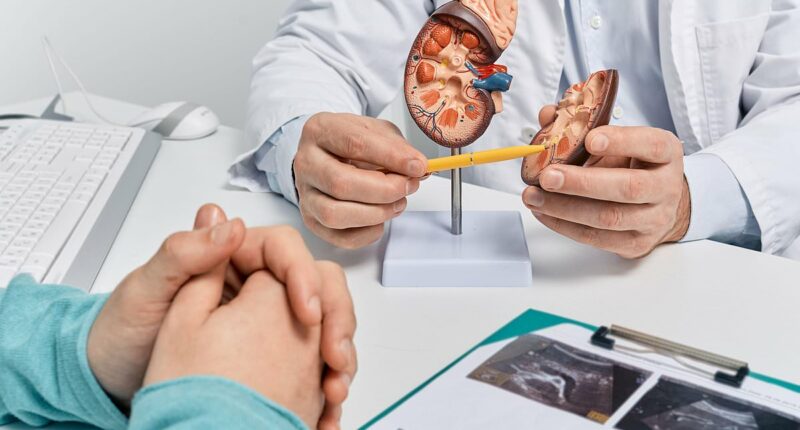Share this @internewscast.com
Suffering from recurrent urinary tract infections could be a sign of kidney cancer, a nurse has warned.
As stated by Cancer Research UK, around 4,700 individuals in the UK succumb to kidney cancer each year, ranking it as the thirteenth leading cause of cancer-related fatalities.
Unlike other cancers, which are easier to screen for, kidney cancer often develops without noticeable symptoms. Consequently, detection typically occurs at an advanced stage, limiting available treatment options.
According to a recent report by Kidney Cancer UK, 80% of kidney cancer cases are discovered incidentally, with 55% identified during scans or tests for unrelated medical issues.
Worryingly, 37 per cent show zero symptoms of the disease whatsoever.
It’s why Hazel Jackson, a lead nurse from the charity, describes it as a ‘silent disease’.
She said: ‘Many people don’t notice anything wrong until it’s more advanced.
‘That’s why spotting the early warning signs is so important.’

Hazel Jackson, a nurse at Kidney Cancer UK, says that recurrent UTIs should never be ignored

Recognized as one of the most rapidly increasing cancers in both the UK and the US, especially among those under 50, kidney cancer earns the nickname ‘silent killer’ for its tendency to remain symptomless until it progresses significantly.
Ms. Jackson pointed out that two significant warning signs prompting a visit to your doctor include the presence of blood in your urine and frequent urinary tract infections (UTIs).
‘Blood in your urine is often the biggest red flag,’ she said, adding that it can show up in a variety of guises.
These include deep red or brown urine, passing water with a pink tinge, or noticing blood on toilet paper once you’ve finished.
‘Some people assume a small drop isn’t worth worrying about, but in essence, any blood in your urine is abnormal and should be checked immediately.
‘While these symptoms could result from something benign, like a kidney stone or infection, they could also be early indicators of kidney cancer. It’s crucial not to overlook these signs,’ she advised.
The other urine-based warning sign is suffering from UTIs one after the other.
A UTI, is an infection in any part of the urinary system, and can have different names depending on which part of the urinary tract is infected.
Cystitis affects the bladder, pyelonephritis affects the kidneys and urethritis affects the ureter and urethra.
Typical symptoms include a burning feeling when urinating, a frequent urge to urinate, despite little urine coming out upon doing so and dark, cloudy or strange-smelling urine.
Ms Jackson continued: ‘Though most UTIs are harmless, repeated infections can mask serious kidney problems, including, in rare cases, cancer,’ she said.
‘Symptoms of kidney cancer can be vague and don’t always appear together.
‘That’s why it’s vital to trust your instincts.
‘If you notice blood in your urine, ongoing pain, or repeated infections, see your GP and push for checks.’
Almost 14,000 Britons are diagnosed with kidney cancer every year, with 4,700 deaths. In the US, there are around 80,000 new cases annually.
Cases are also climbing sharply in younger adults.
People born in 1990 are up to three times more likely to develop the disease than those born in the 1950s—a trend doctors say is partly driven by rising obesity and high blood pressure.
A report by Kidney Cancer UK published earlier this year also revealed that almost all cases of the disease are spotted by accident.
That means patients are only being diagnosed when they have a scan for an unrelated condition or in A&E.
Just one in five of the patients polled by the charity said their condition was spotted because they were sent for relevant tests by their GP.
Risk factors for the cancer include smoking, obesity, high blood pressure, chronic kidney disease or family history.















